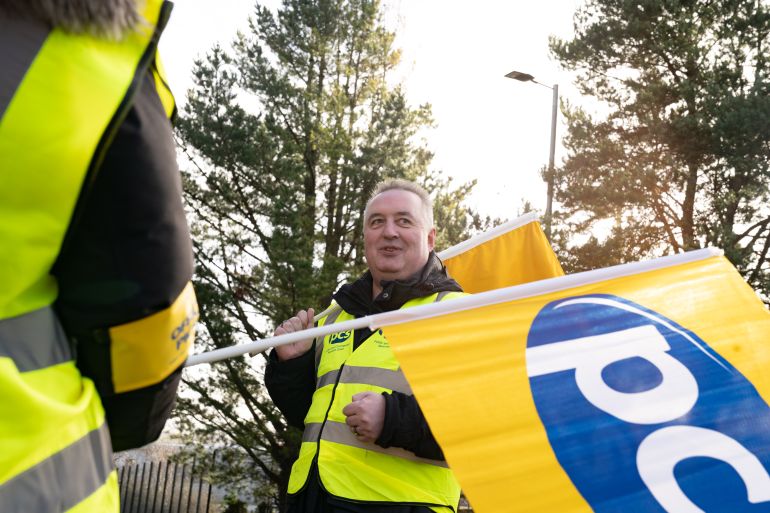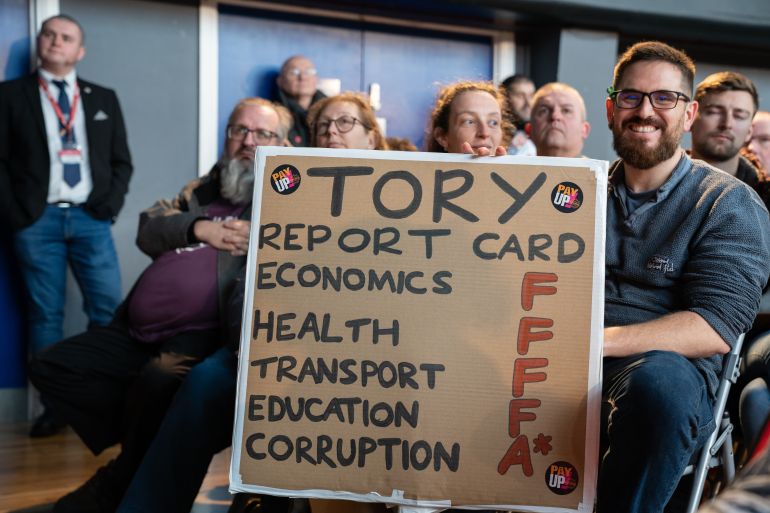‘Enough is enough’: A UK union rep fighting from the picket line
For Mark Dollar, a family man and Dungeons & Dragons enthusiast, strike action against National Highways is not about the last 12 months, but the last 12 years.

Mark Dollar, the representative of the Public and Commercial Services Union for the National Highways, at a picket in Exeter, UK
[Lexie Harrison-Cripps/Al Jazeera]
Surrey, United Kingdom – Wearing a luminous yellow vest stamped with the words “PCS” and “Public and Commercial Services Union”, Mark Dollar, 50, stood on the pavement of an industrial estate in southwest England one January morning. Next to him, outside the National Highways office, three other picketers held furiously flapping PCS flags and red placards announcing an “official picket”.
Their conversation flowed from work frustrations to gossip, periodically interrupted by beeps and waves from passing car and truck drivers as they pulled into the surrounding car parks.
This was just one of many pickets for Dollar, who is the PCS trade union representative employed by the National Highways – a government-owned company tasked with keeping 4,500 miles (7,242km) of Britain’s arterial roads and motorways safe, clear and moving. PCS describes itself as “the largest trade union in the civil service, representing workers in the public sector as well as commercial and private sector workers who work on government contracts”.
Following a PCS ballot in November last year, members across 124 business units – including National Highways – voted in favour of industrial action, hoping to achieve a 10 percent pay rise, improved pensions benefits and job security.
“Members are angry,” PCS general secretary Mark Serwotka said in a press release. “They helped to keep this country running during the pandemic, and in return, have been treated appallingly by this government. With inflation now at 11.1 percent, it is inconceivable that they are expected to cope with yet another real terms pay cut.”
The outcome of the vote came on the back of a civil service pay freeze announced by the then chancellor of the Exchequer, now prime minister, Rishi Sunak, in 2020 and his later failure to deliver his promised “fair and affordable pay rises” in 2021.
“You have to take a stand because being meek and reasonable and not voting in favour of action, goes precisely nowhere,” Dollar said about the ballot.
As National Highways PCS representative, the ballot meant Dollar had a six-month mandate to organise industrial action, creating maximum effect using the minimum number of workers, he explained. By keeping the action small, he planned to use PCS funds to compensate workers for their loss of earnings on strike days, but with the UK government refusing to engage with the strikers, Dollar had a fight ahead.
Mark Dollar gave a talk at a joint union rally at the Exeter Corn Exchange
earlier this year
[Lexie Harrison-Cripps/Al Jazeera]
‘Not your classic trades union rep’
Dollar admits that he is not “your classic trades union rep”. He was privately educated, his father and grandmother had significant roles in the UK’s Conservative Party, and he counts “a senior Conservative councillor” in his friendship group. Yet, he says he remains “fiercely left wing”.
As a teenager, he dreamed of joining the British Army’s Parachute Regiment and then trying out for the elite UK Special Forces. He joined the Ministry of Defence-sponsored youth organisation, the Combined Cadet Force, reaching the top rank of warrant officer before reading combined arts at the University of Plymouth, specialising in theatre production and military history.
However, Dollar had to put his military plans to one side when his girlfriend at the time, Paula, was diagnosed with terminal cancer. They married when Dollar was just 21, but “with a very sick wife, travelling around the world, jumping out of aeroplanes, meeting new and interesting people … wasn’t an option”, he said with a trace of sadness in his voice.
Dollar found work at National Highways, then known as the Highways Agency, and not giving up entirely on his military dream, he joined the Royal Signals Army Reserves, a branch of the British Army for part-time civilian soldiers.
Paula died just three years later.
It would be another decade before he would meet his current wife, Shaunne. When asked how they met, Dollar tried to suppress a giggle. He smiled sheepishly as he confessed that they met “at a live action role play event”, which he describes as “Medieval Reenactment meets Lord of the Rings, or perhaps Dungeons & Dragons”. Although his “favourite description however is ‘cross-country pantomime’ … with combat”, he would later write in one of our email exchanges.

Dollar and members of ASLEF Union after a joint union rally in Exeter
[Lexie Harrison-Cripps/Al Jazeera]
The makings of a union man
Speaking over Zoom from his home in Exeter earlier this year, Dollar explained how he ended up joining the PCS Union and why he believes it is important.
In the years after joining the Highways Agency, he became increasingly frustrated with management, both in relation to his own stagnating career and also after witnessing other colleagues “being bullied by managers who acted with impunity”, he said.
“I didn’t think my union was doing enough … so I wrote some fairly damning articles,” Dollar said, referring to a newsletter he created for employees in his office.
Although the Union was initially good-natured, after a “couple of years” Dollar said they asked him to stop publicly criticising them, and instead work with them.
So he did just that.
Six years after he first joined the Highways Agency, Dollar became the representative for the southwest, joining the national executive committee of the PCS Union. His first goal was to eliminate workplace bullying.
Over the next few years, he worked to “stamp out the antagonistic, anti-trade union attitudes of management”, he explained, but said, “PCS was never, you know, particularly radical or antagonistic or aggressive”.
Referring to the stigma that is normally associated with unions in the UK, Dollar believes that people are living in the past and they think that all trade unions are the same, he said. “The problem is, people don’t remember the Public and Commercial Services Union, they remember the miners’ strike,” he said, in reference to the coal miners’ strikes in the 1970s, which caused the government to declare a state of emergency, and the violent confrontations between police and strikers in the 1980s.

Dollar stands in the audience during a union rally
[Lexie Harrison-Cripps/Al Jazeera]
In the last three years, Dollar has created a new employer relationship framework agreement, signalling a new way that management and staff can work together.
“I even played golf,” he said during one of our calls, a trace of humour in his voice, before self-deprecatingly adding that consistently losing games to management may be the reason for the improved relationship with his union.
There is no trace of a “them and us” sentiment in Dollar’s opinions of management. For instance, Dollar’s response to the executive director, Nick Harris, earning more than seven times the median staff remuneration in the accounting year 2021-22 (355,124 pounds or $434,189), was that “he has responsibility for over 100 billion pounds [$122bn] of assets. Most people with that responsibility in the private sector would be on considerably more.”
His frustration lies squarely with the government, which a PCS spokesman said in May, had “refused to negotiate”.
The Cabinet Office told Al Jazeera earlier in the year that “discussions will continue” but that “the PCS Union’s demands would cost an unaffordable 2.4 billion pounds [$2.9bn] which risks stoking inflation and prolonging the cost of living pain for all workers” – an argument Dollar does not agree with “not least because it fails to take into consideration the amount already earmarked for pay anyway, but also the idea that it is ‘unaffordable’”, he said.
In the latest government concessions offered this month, Jeremy Quinn MP, the Minister for the Cabinet Office, met with PCS to discuss redundancy terms, job security and pay rises, including individual lump sum payments of £1,500 ($1,865) each. In a PCS press release on June 5, the Union said it plans to meet with the Cabinet Office to confirm that “payment is made to all members”. On behalf of National Highways PCS members, Dollar has been working on this “flat out since [the announcement]”, he said.
Despite Dollar’s opinions of the UK government, he remains positive about the National Highways management team, which he believes is “walking a tightrope between ministers and the staff representatives”.
“I’m loath to criticise them,” he added, crediting management with understanding “the importance of employee relations and [doing] their level best to put the best pay deal they possibly could on the table but they were hamstrung when the government didn’t give them the cash to make it better.”
Dollar respects international tactics, calling the French – who have been holding massive strikes against pension reform – the “most effective strikers anywhere on the planet”. But he is “not advocating that PCS should turn up in London, go set fire to half of it, or invade Harrods … but at the same time we do need to work out ways of being more effective against a totally intransigent government”, he said.
At a union rally, a man holds a sign criticising the UK Conservative Party
[Lexie Harrison-Cripps/Al Jazeera]
Some hard days
Dollar is rarely without a smile on his face. Last year, he even good-naturedly appreciated the irony of having to call off planned industrial action when the picket materials were delayed due to a postal workers’ strike.
When it finally happened in Bristol, southwest England, a selection of road traffic operators and regional operations centre staff stood outside for three hours during a bitingly cold December day, accompanied by a black Alsatian called Prince, also kitted out in a luminous yellow vest.
On the picket line, Dollar swapped quips with other picketers about the weather while showing no signs of being affected by the cold, that was no match for his army fatigues, Norwegian National Guard hat and chunky-knit black wool sweater. As it started to rain, he explained how he and his family have been affected by the rising cost of living and real-terms pay cuts.
“We have to make very careful decisions about putting the heating on,” he said. “We’re extremely careful about when we run appliances. And I’m not saying that everybody deserves to have some kind of carefree energy but it really does start playing on your mind more,” he said.
Dollar was joined that day by James Davies, the regional secretary for PCS for the southwest, who told Al Jazeera, “we aren’t asking to live the life of luxury, we just want to live without having to go to the food banks”, while stamping his feet in a futile attempt to stay warm. “Some of our members can’t even come to work because they can’t afford to fill up their cars with petrol or afford after-school clubs for their children.”
Despite Dollar’s optimistic outlook, when pressed, he confessed that his job involved difficult moments. He is responsible for the union’s hardship fund that distributes money to the most deserving. Not only do workers lose pay for the days that they are on strike, but some have also been further penalised by losing extra managerial responsibilities, he said.
Workers can apply to the hardship fund for compensation, but with limited resources, Dollar and the committee must be systematic in ensuring the money is used “wisely and fairly for the benefit of the people who are really struggling”, he said, before adding, “I wish I could pay every single penny that these people are asking for.”

Children colour while the audience listens to speakers at a joint union rally in Exeter [Lexie Harrison-Cripps/Al Jazeera]
Dollar’s hardest days come from feeling unable to help the members he represents. “I’m 50 percent lawyer, 50 percent counsellor,” he said. “Some days when you’ve got a really emotional member who’s got a lot to get off their chest and is crying down the phone … it’s a problem when they’re bringing up stuff you can’t help them with as it’s outside the remit of the union.”
“My wife can usually tell when I’ve had a really rough day,” he said, before seemingly attempting to steer the conversation back into positive territory by stoically adding that after a few minutes of “decompression”, he can turn his attention back to his family.
By April, little had changed. The PCS said the “industrial landscape in the UK remains bleak with double-digit inflation, pay held way below inflation and a government resolutely ignoring strike action in the hope it will all just go away”.
Dollar’s six-month mandate ended at the beginning of May. In the ballot, National Highways was seven votes short of reaching the required 50 percent voter turnout, meaning that they will no longer be striking, however, with such a close vote, Dollar is hoping for a repoll, he said in a WhatsApp message.
Even without industrial action, Dollar’s responsibility towards the members he represents will continue and it is clear that they value the work he does.
During the Exeter picket, Dollar had to step away for a few minutes leaving three picketers standing on the pavement near the entrance to the industrial estate.
Surrounded by flapping PCS flags and various items of “official picket” paraphernalia, two women in bobble hats and down jackets, and a man in a hooded sweatshirt, started a conversation about how Dollar and the union had helped their cases.
“He’s so intelligent.”
“He’s lovely, isn’t he.”
“He’s so bloody good … he fought [my issue] all the way for me.”

Mark Dollar stands with other PCS members at a picket line in Exeter
[Lexie Harrison-Cripps/Al Jazeera]
Eight quick questions for Mark Dollar:
1. What does going on strike mean for you? It means our members have had enough and are prepared to take a stand against their standard of living falling even further.
2. What’s the one thing you wish people understood about why you are striking? I wish people understood that it’s not just about the last 12 months, it’s about the last 12 years of real-terms pay cuts, attacks on our terms and conditions and constant belittling in the media by the ruling party. Enough is enough, now we are fighting back.
3. If your strike demands were met, what would it change for you? It would start, and only start, to reverse some of the harm done by years of pay cuts and attacks on our working conditions, pensions and redundancy pay. It might even stabilise the workforce and make the company and the public sector a more attractive place to work.
4. What do you think of the way strikers are portrayed in the media? It depends on which media. The right-wing media want to paint every striker as a hard-left political dinosaur from the 1970s intent on a Soviet-style state. Everyone else has the sense to realise strikers are ordinary people, working people, having to use the last resort of industrial relations in order to make themselves heard.
5. Do you think the general public supports your strike? Yes, I do, not only from polling that a number of sources have carried out but also by the support we have received on the picket lines. The public see us for what we are; we are them, we are members of the public, we are taxpayers, we are the people on their street, we aren’t wealthy former bankers in subsidised bars in Westminster totally out of touch with reality.
6. What advice would you give to people striking elsewhere or considering striking? Believe in yourselves, spell out your cause clearly, and try to bring the public with you. Don’t be afraid to challenge authority; there’s a lot more of us than there are of them, and they know it.
7. When it comes to striking – who inspires you and why? I think Mick Lynch has become an inspiration to many trade unionists recently. And you can’t argue with how effective the late Bob Crow was for his members. But when it comes to protests against seemingly overwhelming odds, it’s difficult to look any further than The Suffragette movement.
8. Do you have a favourite chant, song or banner? None of those as it happens, but I am quite fond of the PCS Balloon that appears at marches in London; you struggle to miss it in the crowds!
SOURCE: AL JAZEERA





















